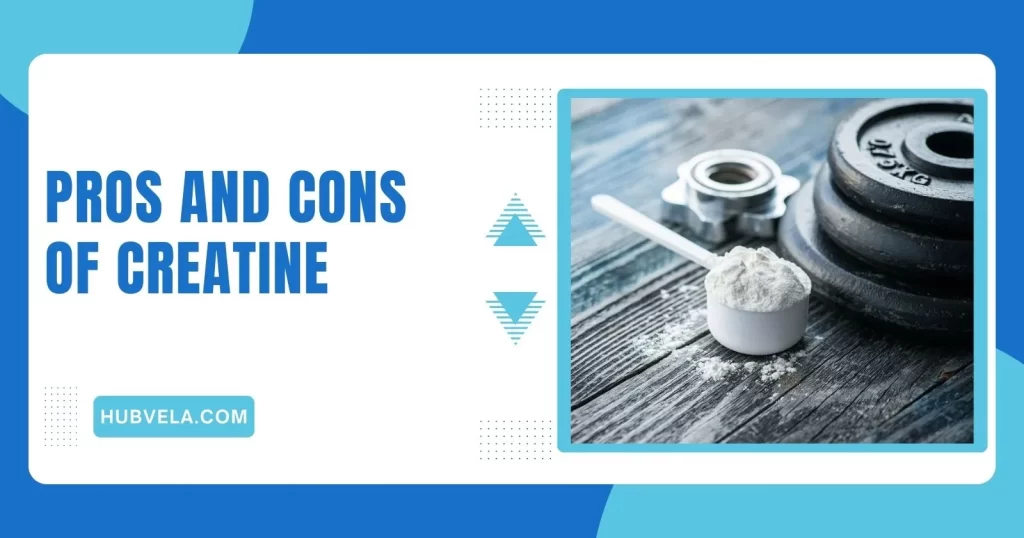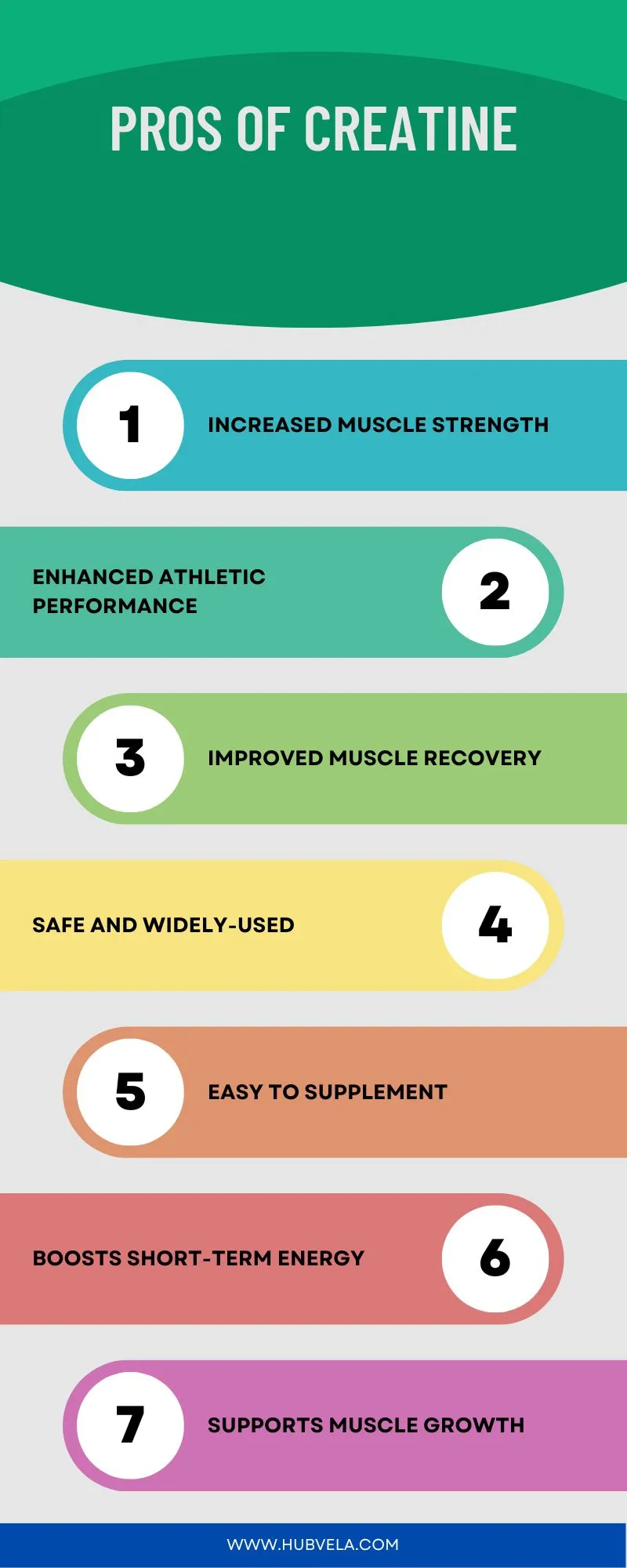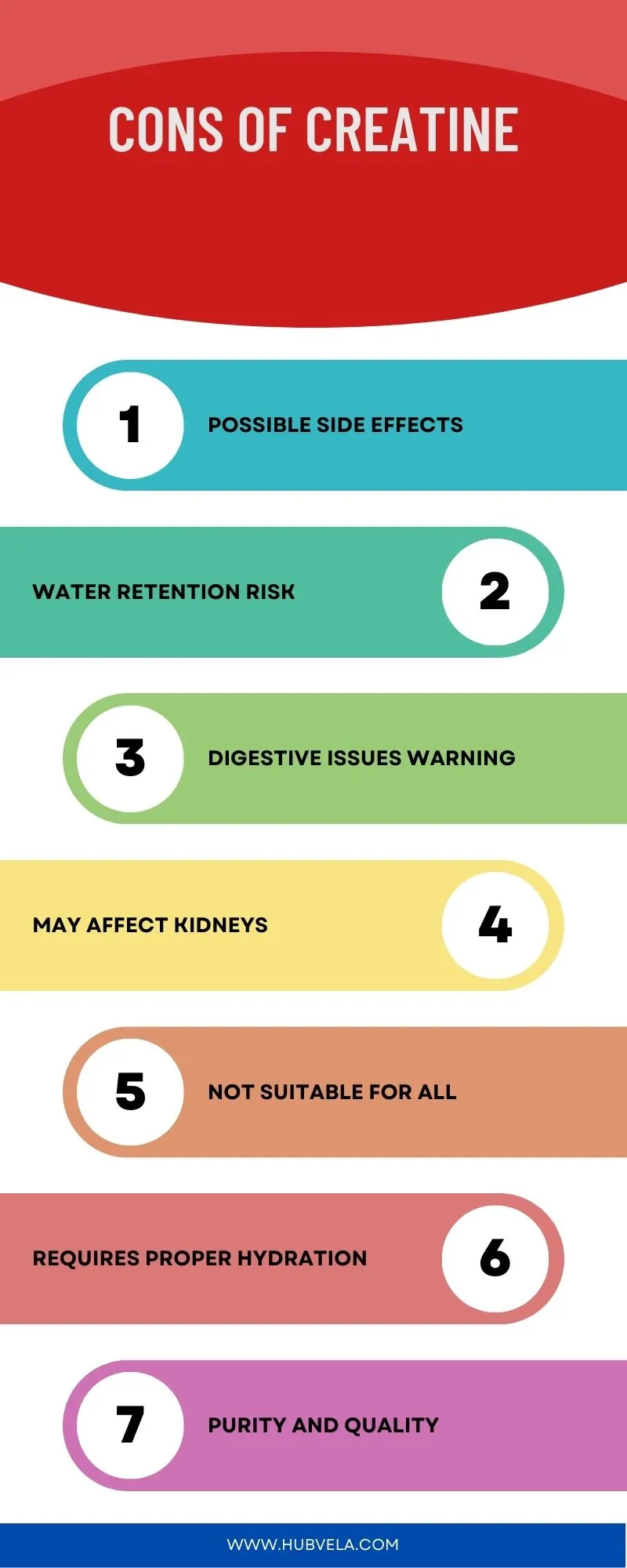When considering the use of creatine, you’ll find both benefits and drawbacks worth exploring.
Enhanced muscle strength, improved athletic performance, and quicker muscle recovery are enticing advantages.
However, the potential impact on kidney function and its unsuitability for everyone may give you pause.
Proper hydration is crucial, and ensuring the purity and quality of the supplement is paramount.
As you weigh these factors, a well-rounded understanding of creatine’s effects awaits your consideration. Let’s discuss the pros and cons of creatine.

--Advertisement--
Pros of Creatine
Creatine has emerged as a popular supplement among athletes and fitness enthusiasts seeking to optimize their performance and muscle growth.
This potent molecule, naturally produced in our bodies, plays an essential role in energy production during high-intensity exercise.
We explore the pros that creatine offers, highlighting its potential to enhance athletic prowess across various sports disciplines.

1. Increased Muscle Strength
Creatine supplementation consistently enhances muscle strength in individuals engaged in resistance training. This occurs because creatine helps your muscles produce energy more efficiently during high-intensity workouts, allowing you to push yourself harder and lift heavier weights.
By increasing your muscle’s phosphocreatine stores, creatine aids in quick energy production, leading to improved strength gains over time. Studies have shown that creatine users typically experience greater increases in muscle strength compared to those who don’t supplement with creatine.
The enhanced strength benefits of creatine can help you break through plateaus in your training, allowing you to achieve new personal bests and make progress toward your fitness goals.
2. Enhanced Athletic Performance
Boosting your endurance and power output, creatine can significantly enhance your athletic performance during high-intensity activities. By increasing the phosphocreatine stores in your muscles, creatine aids in the rapid production of adenosine triphosphate (ATP), the energy currency for muscle contractions. This allows you to push harder and longer during workouts, leading to improvements in strength, speed, and power.
Studies have shown that creatine supplementation can be particularly beneficial for activities that require short bursts of intense effort, such as sprinting or weightlifting. With enhanced athletic performance, you may experience better overall training adaptations and performance gains, making creatine a valuable supplement for athletes looking to maximize their workout potential.
3. Improved Muscle Recovery
With creatine supplementation, you can experience faster muscle recovery after intense workouts. Creatine helps by replenishing adenosine triphosphate (ATP) levels in your muscles, which can aid in quicker recovery times between exercise sessions. This means you may be able to push yourself harder during workouts knowing that your muscles will recover more efficiently.
By enhancing the body’s ability to regenerate ATP, creatine can reduce muscle damage and inflammation post-exercise, allowing you to bounce back faster for your next training session. This accelerated recovery process can be especially beneficial for athletes and fitness enthusiasts who engage in high-intensity training or resistance exercises regularly.
Remember to stay hydrated when using creatine to maximize its muscle recovery benefits.
4. Safe and Widely-Used
Enhancing muscle recovery is just one of the many reasons why creatine stands out as a safe and widely-used supplement among athletes and fitness enthusiasts alike. Beyond its muscle recovery benefits, creatine is known for its safety profile when used as directed. It has been extensively researched and deemed safe for consumption by various health organizations.
Creatine is widely available in various forms like powders, capsules, and ready-to-drink beverages, making it convenient for users to incorporate into their daily routines. Its popularity among athletes across different sports speaks to its efficacy and reliability. With proper hydration and adherence to recommended dosages, creatine is a trusted supplement that can help enhance athletic performance and support muscle growth effectively.
5. Easy to Supplement
Creatine supplementation offers a convenient and straightforward way to enhance athletic performance and support muscle growth effectively. By simply adding a scoop of creatine powder to your water or protein shake, you can easily incorporate this supplement into your daily routine.
Unlike some other supplements that require specific timing or complicated dosing schedules, creatine can be taken at any time of the day without much hassle. This simplicity makes it a popular choice among athletes and fitness enthusiasts looking to reap the benefits without added complexity.
With creatine, you don’t need to worry about intricate protocols or special instructions – just mix it in and you’re good to go, making it a hassle-free addition to your regimen.
6. Boosts Short-Term Energy
For athletes seeking a quick energy boost during intense workouts, incorporating creatine into your routine can provide a significant advantage. Creatine works by rapidly replenishing adenosine triphosphate (ATP) stores in your muscles, allowing for increased bursts of energy during short, high-intensity exercises.
By enhancing ATP production, creatine aids in powering your muscles for explosive movements like sprinting or weightlifting. This quick energy boost can help you push through tough sets, sprint that extra mile, or lift heavier weights, ultimately improving your overall performance during workouts.
With creatine supplementation, you may experience less fatigue and greater stamina, enabling you to maximize your training sessions and achieve better results in a shorter amount of time.
7. Supports Muscle Growth
Achieving muscle growth is a key benefit of incorporating creatine into your fitness regimen. Creatine helps increase the body’s ability to produce energy rapidly, enabling you to push harder during workouts and lift heavier weights.
By enhancing your performance in the gym, creatine promotes muscle hypertrophy, leading to greater gains in muscle mass over time. This supplement also boosts water content within muscle cells, creating a more favorable environment for muscle growth.
Creatine has been shown to increase the levels of insulin-like growth factor 1 (IGF-1), a hormone that plays a crucial role in muscle growth. With regular use of creatine alongside a balanced diet and consistent training, you can optimize your muscle-building potential and achieve your fitness goals more efficiently.
Cons of Creatine
Creatine, a popular supplement among athletes and fitness enthusiasts, has long been praised for its potential to enhance muscle strength and performance.
However, amidst its widespread use, concerns about the potential drawbacks of creatine supplementation have emerged. We will explore the cons of creatine.
While creatine undeniably offers benefits, it is essential to weigh its pros and cons to make informed decisions about its incorporation into one’s fitness regimen.
Let’s explore the lesser-known aspects of creatine supplementation and gain insights into its potential downsides.

1. Possible Side Effects
While creatine is generally considered safe for most people, there are potential side effects that individuals should be aware of before deciding to use it. Some common side effects of creatine supplementation include gastrointestinal issues like diarrhea, nausea, and stomach cramps. Some individuals may experience muscle cramping, dehydration, and dizziness.
Creatine can also lead to weight gain due to increased water retention in the muscles. In rare cases, allergic reactions such as rash, itching, or difficulty breathing may occur. It’s important to stay hydrated while taking creatine to minimize the risk of side effects. If you experience any severe or persistent side effects, it’s advisable to discontinue use and consult a healthcare professional.
2. Water Retention Risk
Experiencing water retention is a potential drawback associated with using creatine as a supplement. When you start taking creatine, your muscles may retain more water, leading to a temporary increase in water weight. This can make you feel bloated or puffy, which may be undesirable for some individuals, especially those looking to maintain a lean physique.
While water retention is generally harmless and resolves once you stop taking creatine, it can be a concern for those sensitive to fluctuations in water weight. To mitigate this effect, staying well-hydrated is crucial as it can help your body regulate water balance more effectively.
Monitoring your overall fluid intake and adjusting as needed can help manage any potential water retention issues while using creatine.
3. Digestive Issues Warning
A potential downside of using creatine as a supplement is the risk of experiencing digestive issues. These issues may manifest as bloating, diarrhea, or stomach discomfort. Creatine draws water into your muscles, which can lead to dehydration if you don’t drink enough water.
To minimize digestive problems, consider starting with a lower dose and gradually increasing it. Make sure to drink plenty of water throughout the day to stay hydrated. Choosing a high-quality creatine supplement from a reputable brand can also help reduce the likelihood of experiencing these digestive issues.
If you already have sensitive stomach or digestive problems, it’s advisable to consult a healthcare professional before adding creatine to your regimen.
4. May Affect Kidneys
Using creatine as a supplement may potentially impact the functioning of your kidneys. While many studies suggest that short-term use of creatine is generally safe for healthy individuals, there are concerns about the long-term effects on kidney health.
Creatine can cause the kidneys to work harder to eliminate waste products from the body. Individuals with pre-existing kidney conditions may be at a higher risk of experiencing kidney damage when using creatine supplements.
It’s crucial to stay hydrated when taking creatine to reduce the strain on the kidneys. If you have any kidney issues or concerns, it’s advisable to consult with a healthcare professional before starting a creatine regimen to ensure it’s safe for you.
5. Not Suitable for All
Creatine supplementation may not be suitable for everyone due to potential individual variations in response and tolerance levels. Some people may experience gastrointestinal issues like nausea, cramping, or diarrhea when taking creatine.
Individuals with pre-existing kidney conditions or a history of kidney problems should avoid creatine supplementation, as it may put extra strain on the kidneys. People who are prone to dehydration or individuals taking medications that could interact with creatine should also consult a healthcare professional before starting supplementation.
Those under 18, pregnant women, and breastfeeding mothers are advised to avoid creatine due to insufficient research on its effects in these populations. It’s essential to consider these factors before deciding to include creatine in your dietary regimen.
6. Requires Proper Hydration
Staying well-hydrated is crucial when incorporating creatine into your fitness routine. Creatine can draw water into your muscles, which may lead to dehydration if you’re not drinking enough fluids.
Dehydration can cause muscle cramps, dizziness, and an overall decrease in performance during your workouts. It’s recommended to drink extra water when taking creatine to maintain proper hydration levels.
Without adequate water intake, creatine supplementation may not be as effective and could potentially result in adverse effects like digestive issues. Remember to listen to your body and adjust your water intake accordingly when using creatine to ensure you stay hydrated and get the most out of your workouts.
7. Purity and Quality
Ensuring the purity and quality of the creatine you consume is essential for minimizing potential drawbacks and maximizing its effectiveness in your fitness regimen. Poor-quality creatine can contain impurities that may harm your health or hinder your workout results. Low-grade creatine may lead to digestive issues like bloating, cramping, or diarrhea.
Contaminants in inferior products could also have long-term negative effects on your overall well-being. Lower-quality creatine may not dissolve well, making it harder for your body to absorb and utilize the supplement effectively.
To avoid these pitfalls, opt for reputable brands that provide high-quality, pure creatine monohydrate, ensuring you get the most out of your supplementation without compromising your health or fitness goals.
Conclusion on Pros and Cons of Creatine
Overall, creatine can be a beneficial supplement for improving strength, muscle mass, and athletic performance.
However, it may also have some potential drawbacks such as water retention and gastrointestinal issues.
It’s important to weigh the pros and cons of creatine before deciding to incorporate it into your fitness routine.
Remember to consult with a healthcare professional before starting any new supplement regimen.


